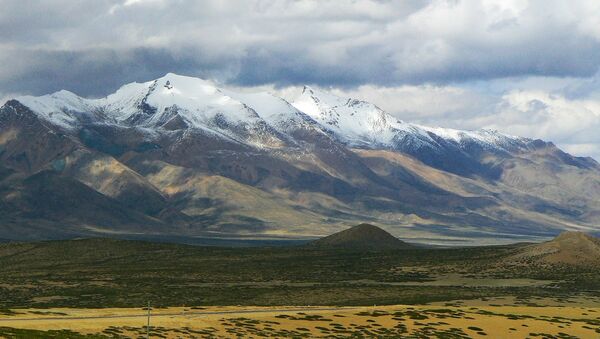New Delhi (Sputnik) — Indian citizens have resumed the sacred pilgrimage that requires them to traverse the difficult Himalayan terrain to reach the sacred Mansarovar Lake via Nathu La Pass in Sikkim. The pass was closed by China last year following the standoff at the disputed Doklam plateau, which borders Sikkim.
READ MORE: Cooperation at SCO Can Streamline India-Pakistan Peace Efforts — Analyst
The first batch of 60 pilgrims was flagged off on Monday from Delhi by the minister of state for external affairs. The first batch will take the Lipulekh pass route in the northern state of Uttarakhand, while some of the subsequent batches will take the Nathu La pass route in the northeastern state of Sikkim. These are the only two routes for the "Kailash-Manasarovar Yatra."
Flagging off the first batch of Kailash Mansarovar Yatra 2018! MoS @Gen_VKSingh addressed the first batch of 58 Yatris going via Lipulekh pass. The batch was also briefed about arrangements made for Yatris en route. pic.twitter.com/YpkfqaJq7t
— Raveesh Kumar (@MEAIndia) June 11, 2018
The Nathu La route, inaugurated in June 2015, is administered by the Tibet Autonomous Region government on the Chinese side. It cuts short the trekking time.
"This year 3,734 applications were received. After drawing of lots, around 1500 were selected for the Yatra," General V.K. Singh (retired), India's minister of state for external affairs, said after flagging off the first batch in New Delhi.
The pilgrims will reach Kailash Manasarovar via Lipulekh in eighteen batches of 60 pilgrims each. Ten batches of 50 pilgrims each will reach there via Nathu La, the minister said.
READ MORE: Quad Partners Will Not Defend India Against China — Indian Navy Chief
Mount Kailash is a 6,630-meter high peak in the trans-Himalayan mountain range in the Tibet Autonomous Region. Just 20 kilometers away from Mount Kailash is the sacred blue and emerald green Manasarovar Lake, which lies at a height of 4,577m (15,015 ft). The lake is known to be an epitome of purity, containing healing properties and the power to wash off all mortal sins. The twin destinations are deeply revered by Indians of the Hindu, Buddhist and Jain communities.


